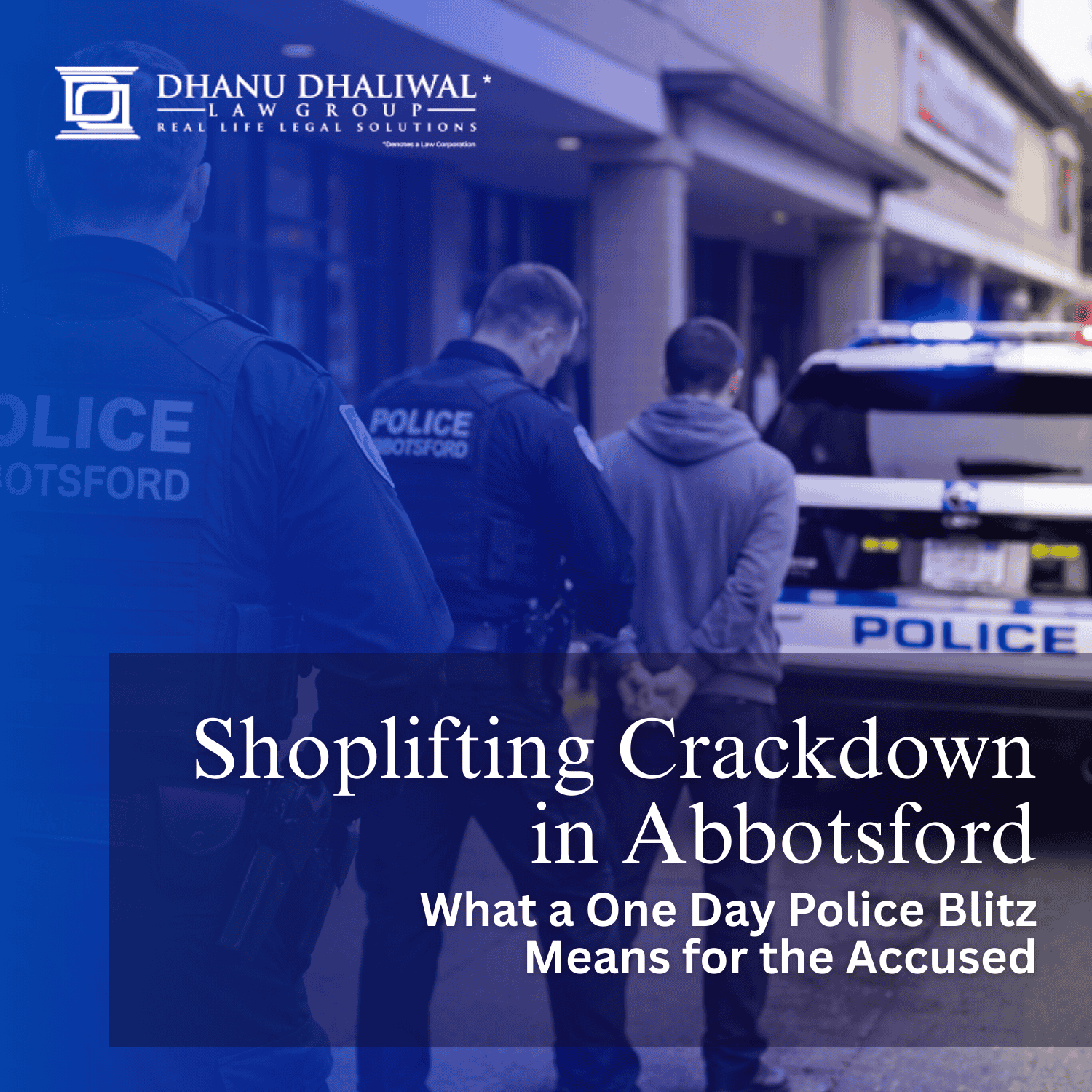Earlier this week, Rob Dhanu KC, co-founder of Dhanu Dhaliwal Law Group and former federal Crown prosecutor, joined The Jill Bennett Show on 730 CKNW to discuss the statutory release of convicted child abductor and sex offender Randall Hopley. In this interview, Rob breaks down how statutory release works, why offenders like Hopley must be released after serving two-thirds of their sentence, the limits of judicial power once sentencing is complete, and the challenges police and communities face when monitoring high-risk offenders.
Listen to the full audio and read the transcript below.
Transcript: Rob Dhanu on The Jill Bennett Show (730 CKNW)
Jill Bennett (Host):
This is the Jill Bennett Show on 730 CKNW. Well, thanks for being with us.
This is a difficult story, but it is one that is so important. Vancouver police have actually put out a warning about the release of this individual.
We fully understand that there’s a lot of concern in the community when a person like Randall Hopley is released into the community, and there are a lot of questions asked about why he’s released. That’s completely understandable.
And let’s be clear. We’re not thrilled that he’s here either. We didn’t ask for this, but he’s here now and he’s been released into our community and we have to mitigate the risk to the public that he poses.
He’s somebody who’s committed offenses against children. He’s somebody who’s been convicted of very serious offenses. And he’s somebody who’s repeatedly breached the conditions of his releases. We’ve arrested him a number of times, and now the decision has been made by Correctional Service Canada to release him, and he’s going to be living in Vancouver. That’s not something that we have any control over.
That was Vancouver Police Sergeant Steve Addison. He was talking about the release of Randall Hopley.
And if you think that name is familiar, that is because it is familiar—not only from when he was first convicted of a crime involving the abduction of a young boy, but also for when he cut off an electronic monitoring bracelet and then was on the lam for about 10 days before he turned himself back in at a police station.
So police have issued that warning, but we also know that Randall Hopley has been released from custody. He was convicted of sexual assault and the abduction of someone under the age of 14, and this is a statutory release.
Well, joining me to explain what exactly that means is Rob Dhanu, former federal Crown prosecutor, criminal defence lawyer, and co-founder of Dhanu Dhaliwal Law Group.
Jill Bennett (Host):
Thank you, Rob, for coming back on the show.
Rob Dhanu:
Mr. Hopley brings us together again, Jill.
Jill Bennett (Host):
He does, unfortunately. And I think for anybody looking at the details of this case, looking at the parole documents, it is a little bit alarming—especially when we hear from police saying they’re not pleased, but this is how the justice system works and he has been released. Can you explain to us again—how does statutory release work?
Rob Dhanu:
Yeah, so police are not pleased. A lot of people are not pleased. The reason that Mr. Hopley is out again is once again because of that concept of statutory release. That is an actual law which requires individuals who are incarcerated to be released after serving two-thirds of their sentence.
The goal of statutory release is to both reduce risk in the community and also to help rehabilitate the offender by having conditions on them so they can be supervised over a period of time.
And in this case—and really in every case—there are very few exceptions where the parole board or provincial corrections can keep someone in custody past that statutory release period.
Jill Bennett (Host):
Does it matter what your actions have been? In this case, people will remember this name because of some of the activities of Randall Hopley when he was released. Talking about the breach of a long-term supervision order, in his parole board documents it says that in November of 2022, he was observed by police at a library. He was within three feet of a group of children with their parents. He was surfing the Internet, looking at websites that involved underwear for men. He didn’t have permission to be in the library. That’s just one of the findings.
We also know that he disappeared for about 10 days. He cut off his electronic monitoring bracelet. Do those things play any role once you are captured?
Rob Dhanu:
They do play a role, but in different parts of the system.
When it comes to corrections and statutory release, corrections would certainly be aware that he’s breached his conditions in the past. The issue is corrections is left with this law, which requires them to release the individual after two-thirds of their sentence, barring some exceptional circumstances.
Where it matters more is earlier in the process. The judge who sentenced Mr. Hopley would have been made aware of his history of prior breaches and not abiding by court orders. The judge then determines, based on that history, how long a sentence he should serve. In cases like this, with a significant history, the judge should be giving a more significant sentence.
Jill Bennett (Host):
So does a judge have any leeway when it comes to statutory release? Can they use those behaviours and change it, or is the law written in a way that once you’ve served a certain amount of time, that’s it?
Rob Dhanu:
Judges in our society are very powerful, Jill. But when it comes to the law, their jurisdiction is in the courthouse—what sentence an offender should serve. After that, they lose their jurisdiction and it is up to corrections to determine when an individual should be released.
Jill Bennett (Host):
So in this case, Randall Hopley has been released with a number of conditions. Looking through them, I don’t see anywhere that says he has to wear an electronic bracelet. For somebody who had a monitoring bracelet before, who cut it off and was on the run for 10 days, wouldn’t it make sense to keep that as a condition?
Rob Dhanu:
That’s interesting, and one would think that would make sense. The conditions do involve monitoring, and it sounds like police will be putting their high-risk supervision unit on him as well.
But yes, it would make a lot of sense to have the highest level of monitoring available for someone like Mr. Hopley. Electronic monitoring should be one of the tools the parole board is using.
Jill Bennett (Host):
Other conditions include: not being near children, no contact with victims, living at a specific place, an 8 p.m. to 6 a.m. curfew, not acquiring pornography, and no Internet access. Are these conditions actually monitored? How easy would it be to breach them?
Rob Dhanu:
That’s a great question, because this is what we don’t think about.
When politicians use slogans like “jail, no bail,” the real issue with our justice system is the resources we devote to it. And resources require taxpayers’ money. The amount of supervision available depends on how much money we put in.
In this case, because Mr. Hopley has such a high media profile and is well-known to police and corrections, more resources will be devoted to monitoring him. But typically, when you don’t have someone of his profile, the resources aren’t there, and it’s easier to breach conditions and walk off.
Jill Bennett (Host):
Police also said they’re asking the public: if you see this individual breaking conditions, contact them. When it’s someone deemed at high risk to reoffend, does it become the job of the public to be the eyes and ears?
Rob Dhanu:
No, it’s not the job of the public. It sometimes puts the public in a dangerous and awkward place. But police do rely on the public. Much of their intelligence comes from 911 calls, Crime Stoppers, and tips. So they are heavily reliant on public input.
Jill Bennett (Host):
One of the other things in the parole papers was that while incarcerated, Hopley completed several sex offender programs, but he was reluctant to discuss specifics of his offense and made few gains. Does that play a role?
Rob Dhanu:
Yes, it does.
It seems Mr. Hopley is gaming the system slightly. He’s doing the programming, so he’s not non-compliant, but he’s not fully engaging either. That puts him in a grey area for the parole board—halfway down the road, but not all the way.
So he doesn’t meet the extreme standard where the parole board could intervene and say: We know there are reasonable grounds to believe this person will breach, so we’re not going to release them at their stat release date.
Jill Bennett (Host):
Given his past, if he disappears again, does that mean he goes back to jail?
Rob Dhanu:
Yes. That would be a breach of his long-term supervision order. He’d go back to jail for at least 90 days, during which the parole board would assess whether to ask Crown to approve criminal charges. He could face further charges, depending on the breach, and then he’d either have another parole hearing or appear in court for bail.
Jill Bennett (Host):
One other question: trying to balance public safety with offender rehabilitation—do you think the justice system does a good job?
Rob Dhanu:
From the outside, it looks like there are all kinds of problems—and there are problems. But we need to take a bird’s eye view and compare ourselves globally.
Look at the United States: their system is in disarray and politicized. Even in Europe, Canada’s system is typically regarded as better. Forget the rest of the world—Canada’s system is considered a Cadillac.
There’s room for improvement, always. But when we look around the world, we are blessed with a great system.
Jill Bennett (Host):
Rob Dhanu, we’ll leave it there for today. Thank you for coming back on the show.
Rob Dhanu:
My pleasure.
At Dhanu Dhaliwal Law Group, we understand how complex and frustrating the justice system can feel—especially in cases involving repeat or high-risk offenders. Our team has decades of experience on both sides of the courtroom, from federal Crown prosecution to criminal defence, and we are committed to protecting the rights and safety of our clients.
If you or your family are facing criminal charges or need legal guidance on matters involving sentencing, parole, or supervision orders, call us today at 604-746-3330 or contact us online.
Frequently Asked Questions About Statutory Release in Canada
Statutory release is a legal requirement under the Corrections and Conditional Release Act. It means most offenders must be released after serving two-thirds of their sentence, even if they have not completed their full term. The goal is to help offenders reintegrate into society under supervision, while still protecting the public with conditions.
Judges cannot prevent statutory release—once a sentence is handed down, the decision shifts to Correctional Service Canada. In rare cases, the Parole Board of Canada can keep someone in custody past their statutory release date if there is clear evidence they pose an immediate risk, but these exceptions are uncommon.
If an offender violates their release conditions, such as breaking curfew, contacting victims, or tampering with monitoring devices, they can be arrested and returned to custody. The Parole Board may impose stricter conditions, extend supervision, or refer the matter for new criminal charges.
No. While electronic monitoring is one tool available to the Parole Board, it is not automatically applied in every case. Monitoring depends on the offender’s risk profile, available resources, and the conditions imposed by the parole board at the time of release.
The public is not responsible for supervising offenders, but police often encourage citizens to report any breaches they witness. Public tips through 911 or Crime Stoppers are an important part of helping authorities enforce release conditions.





